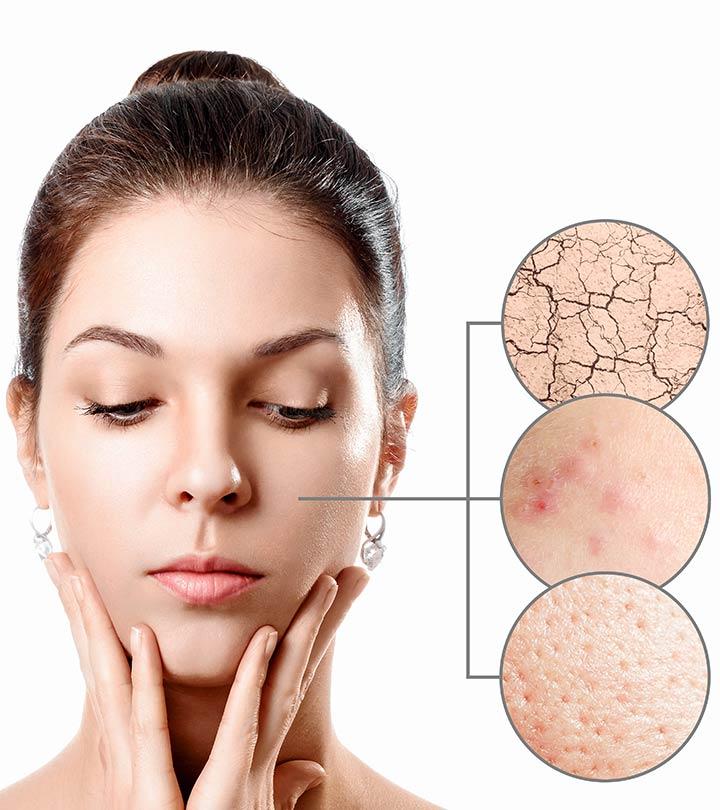Dry Skin Acne: 12 Home Remedies And Tips To Prevent It
Get rid of the breakouts and restore your skin with these simple remedies & treatments.

All those with dry skin know that they are as prone to breakouts as people with oily skin. Contrary to popular belief, acne develops not only on oily skin but also when your pores get clogged with anything. While skin care products talk of reducing acne, not many deliver the results. That is why you should go for natural alternatives that can reduce acne on dry skin without any side effects.
The function of the skin barrier is to fight and keep out foreign substances such as viruses and bacteria and maintain the moisture level in your skin. When your skin becomes dry, it cannot protect the skin from foreign substances, which causes a buildup of dead skin. This results in blackheads, pimples, or whiteheads.
In this article, we have listed several natural remedies you can try at home to get rid of acne on dry skin. Check them out below!
In This Article
What Causes Acne On Dry Skin?
Dry skin is not usually a serious condition, but it can become uncomfortable and unsightly. It is generally triggered by environmental factors like:
- Hot/cold weather
- Low humidity
- Bathing in hot water
- Use of harsh soaps and cleansers
- Chemical irritants like laundry detergent residues
While acne is generally associated with oily skin, it is also becoming increasingly common in dry skin.
Those with dry skin are more prone to the build-up of:
- Dead skin cells
- Cosmetic products
- Dirt and bacteria
The build-up of such particles on the skin can put you at an increased risk of developing acne. Hormonal imbalances and clogging of hair follicles by dry skin flakes are also common triggers of acne. Dry skin disrupts your skin barrier, making it much more prone to inflammation and breakouts (1).
These are the natural ways to get rid of acne. The following are some scientifically-proven ways to eliminate acne on dry skin.
12 Home Remedies For Acne On Dry Skin
1. Lemon Oil
Lemon oil has antioxidant properties that can repair free radical-induced damage on the skin (2). This, in turn, can help control acne. It also contains magnesium ascorbyl phosphate, which has a hydrating effect on the skin (3).
Caution: Do not use this home remedy if you have sensitive skin as lemon oil may cause redness and irritation. Also, apply sunscreen before stepping out after using this home remedy as lemon oil makes your skin photosensitive.
You Will Need
- 2-3 drops of lemon oil
- 1 teaspoon of carrier oil (coconut oil or almond oil)
What You Have To Do
- Add two to three drops of lemon oil to a teaspoon of any carrier oil.
- Mix well and apply to the affected area.
- Leave it on to dry.
How Often You Should Do This
Once daily.
2. Neem
Neem has powerful antimicrobial and anti-inflammatory properties (4), (5). These properties may help in easing acne. A study conducted on mice found that neem leaf extract can prevent skin dryness (6).
Note: You can replace natural neem leaves with neem oil for a more hydrating effect on your skin.
You Will Need
- 10-15 neem leaves
- Water (as required)
What You Have To Do
- Grind the neem leaves with water to make a thick paste.
- Apply the neem paste to the affected area.
- Leave it on for 20-30 minutes.
- Rinse it off with water.
How Often You Should Do This
Once daily.
3. Honey
Honey possesses moisturizing properties that can help nourish and heal dry skin, while its antimicrobial nature can help inhibit the growth of the acne-causing bacteria (7), (8).
You Will Need
- 1-2 teaspoons of organic honey
What You Have To Do
- Apply organic honey to the affected area.
- Leave it on for 20-30 minutes and then rinse it off with plain water.
How Often You Should Do This
1-2 times daily.
4. Turmeric
Curcumin, one of the main components of turmeric, is anti-inflammatory and antimicrobial (9). Thus, turmeric may help get rid of acne on dry skin.
You Will Need
- 1 teaspoon of turmeric powder
- Water (as required)
What You Have To Do
- Add a few drops of water to a teaspoon of turmeric powder.
- Mix well to form a thick paste.
- Spread the paste on the affected area.
- Rinse it off after 20-30 minutes.
- Apply moisturizer to get rid of the dry, stretchy feeling on your skin.
How Often You Should Do This
Once daily.
5. Aloe Vera
Aloe vera has anti-inflammatory and antimicrobial activities. It can be used in combination with topical ointments, like tretinoin, to treat mild to moderate acne (10).
You Will Need
- Freshly extracted aloe vera gel
What You Have To Do
- Extract a little aloe vera gel from an aloe leaf.
- Whisk the gel using a fork and apply it to the affected skin.
- Leave it on for 20-30 minutes.
- Rinse it off with water.
How Often You Should Do This
1-2 times daily.
6. Rose Water
Rose extracts have anti-inflammatory and antioxidant properties (11). The topical application of rose water may help reduce acne and soothe dry skin.
You Will Need
- Rose water
- Cotton balls
What You Have To Do
- Pour a few drops of rose water on a cotton ball.
- Apply it all over the face and let it dry.
How Often You Should Do This
Multiple times daily, preferably after cleansing your face.
7. Orange Peel
Orange peel exhibits antimicrobial and anti-inflammatory properties. It also helps improve skin elasticity (12). Therefore, it may help reduce acne on dry skin.
You Will Need
- Peel of an orange
- Water (as required)
What You Have To Do
- Dry the orange peel in the sun and then powder it.
- Mix the powdered orange peel with water to form a smooth paste.
- Apply it to the affected areas.
- Leave it on for 20-30 minutes.
- Rinse it off with water.
How Often You Should Do This
Once every alternate day.
8. Tomatoes
Acidosis (a disturbance in the pH balance of your body) is a leading cause of acne. Tomatoes are rich in alkaline minerals like calcium, potassium, and magnesium that can restore the natural alkaline balance of the body. Thus, they can prevent acidosis and, ultimately, acne (13).
You Will Need
- ½ ripe tomato
What You Have To Do
- Take a tomato and cut it into half.
- Rub one half of the tomato directly on your face.
- Leave it on for 20-30 minutes before rinsing it off.
How Often You Should Do This
Once daily.
9. Tea Tree Oil
Tea tree oil exhibits strong antimicrobial and anti-inflammatory properties (14). Thus, it could be an effective remedy for treating acne on dry skin. However, make sure to not use it in excess as it may dry out your skin further.
You Will Need
- 2-3 drops of tea tree oil
- 1-2 teaspoons of carrier oil (coconut or almond oil)
What You Have To Do
- Add two to three drops of tea tree oil to one to two teaspoons of any carrier oil.
- Mix well and apply to the affected area.
- Leave it on overnight.
- Rinse it off with water the next morning.
How Often You Should Do This
Once daily.
10. Cucumber
The topical application of cucumber paste can help reduce sebum secretion without drying out the skin. It also moisturizes your skin. Thus, it can help in getting rid of acne on dry skin without causing further irritation (15).
You Will Need
- A few slices of cucumber
What You Have To Do
- Grind four to five slices of cucumber to form a thick paste.
- Apply the cucumber paste evenly to your face and neck.
- Leave it on for 20-30 minutes and rinse it off with water.
How Often You Should Do This
Once daily.
11. Garlic
Garlic contains allicin, which has antimicrobial properties (16). Thus, it may help kill the acne-causing bacteria and give you clearer skin.
Note: Remove garlic immediately from the skin if it starts burning.
You Will Need
- 3-4 garlic cloves
What You Have To Do
- Blend the garlic cloves and apply directly to the affected area.
- Leave it on for 5 minutes before rinsing it off with water.
How Often You Should Do This
Once daily.
12. Potato Peel
A study conducted on mice found that potato skin has anti-inflammatory effects on the skin (17). Therefore, it may help reduce the redness and irritation caused by acne.
You Will Need
- Potato peels
What You Have To Do
- Place the potato peel over the affected areas and allow leave them on for 5 minutes.
- Remove the peels and rinse your face with plain water.
How Often You Should Do This
Twice daily.
While these remedies can help you in managing your dry skin and acne issues, make the following changes in your daily skin care regimen to prevent future breakouts.
Tips To Prevent Acne On Dry Skin
- Choose the right products:
- Use non-foaming cleansers as they are less drying.
- If you are taking treatments for acne, use non-medicated cleansers.
- Choose a non-comedogenic moisturizer that treats dry skin but does not clog your pores.
- Avoid using skincare products that contain harsh and drying ingredients like alcohol, menthol, and eucalyptus.
- Do not use comedogenic cosmetics.
1. Do not wash your more than twice a day: Over-washing your face may strip away the natural oils of your skin. To avoid this, use a moisturizing cleanser to retain your skin’s moisture levels.
2. Moisturize regularly: Moisturize your skin daily to keep it from drying. You can use moisturizers that are formulated for sensitive skin as they are mild yet effective.
3. Avoid using harsh scrubs: Harsh scrubs may create micro-tears on the skin’s surface, thus weakening its barrier and making your skin more prone to dryness.
2 . Always apply sunscreen: Wearing sunscreen daily prevents sun damage to your skin. It also helps reduce the redness caused by acne.
- Do not exfoliate: Exfoliating can strip away the natural oils from your skin and aggravate the dryness.
- Exercise regularly: There is a direct relationship between psychological stress and the severity of acne (18). Working out and practicing yoga regularly have stress-busting effects on the body and mind, which can reduce the severity of acne.
- Follow a healthy and well-balanced diet: Avoid processed cheese and dairy products that are associated with acne. Drink plenty of water to promote skin hydration.
Besides using home remedies and making changes in your skincare regimen, you can also try out over-the-counter medications to manage severe acne. Check them out below.
Over-The-Counter Acne Medications
Some acne treatments can dry out your skin further. Consult a dermatologist to find out which medications are best suited for your skin.
The common topical formulations prescribed for treating acne include:
- Retinoids, which are available as gels, creams, and lotions (19)
- Antibiotics like benzoyl peroxide (Benzaclin, Duac, Acanya) and erythromycin (20)
- Salicylic acid and azelaic acid (21)
- Dapsone, which is available as gels and creams (22)
Most of these medications are over-the-counter formulations that can be used for treating acne. These formulations are usually prescribed in combination with oral antibiotics or contraceptives.
Dry skin acne is as real as oily skin acne. Contrary to the common notion, dry skin is also prone to acne breakouts. Dead skin cells, dirt, bacteria, and cosmetic products can cause acne issues on dry skin. However, following a regular skin care routine and a healthy lifestyle may help you manage acne issues. The home remedies listed above may also help if you use them consistently. Since not all remedies suit everyone, you may have to experiment a little and determine which one gives you the desired result. If you do not see any results, consult your doctor and seek medical treatment to prevent scarring.
Frequently Asked Questions
How do you treat dry acne-prone skin in the winter?
Give the above remedies and tips a shot. You can also avail of medical treatment and try over-the-counter formulations if necessary.
Is Neutrogena good for acne?
Yes, Neutrogena has a range of oil-free acne washes and moisturizers, which can work well with acne-prone skin.
Which is the best moisturizer for acne-prone skin?
It is best to use a mild, oil-free moisturizer for acne on dry skin. Neutrogena and Cetaphil are popular brands that sell such moisturizers. Home remedies like aloe vera and honey can help too.
Is my skin dry or dehydrated?
If you haven’t been drinking enough fluids, you probably have dehydrated skin. If your skin feels dehydrated, it means it lacks water, whereas, dry skin is a result of your skin lacking natural oils.
Sources
- Moisturizers for Acne, The Journal of Clinical and Aesthetic Dermatology, US National Library of Medicine, National Institutes of Health.
https://www.ncbi.nlm.nih.gov/pmc/articles/PMC4025519/ - Biochemical studies on a novel antioxidant from lemon oil and its biotechnological application in cosmetic dermatology, Drugs Under Experimental and Clinical Research, US National Library of Medicine, National Institutes of Health.
https://www.ncbi.nlm.nih.gov/pubmed/10568210 - Vitamin C in dermatology, Indian Dermatology Online Journal, US National Library of Medicine, National Institutes of Health.
https://www.ncbi.nlm.nih.gov/pmc/articles/PMC3673383/ - Medicinal properties of neem leaves: a review, Current Medicinal Chemistry. Anti-cancer Agents, US National Library of Medicine, National Institutes of Health.
https://www.ncbi.nlm.nih.gov/pubmed/15777222 - Medicinals, Neem: A Tree For Solving Global Problems, The National Center for Biotechnology Information, US National Library of Medicine, National Institutes of Health.
https://www.ncbi.nlm.nih.gov/books/NBK234637/ - Topical application of neem leaves prevents wrinkles formation in UVB-exposed hairless mice, Journal of Photochemistry and Photobiology, ResearchGate.
https://www.researchgate.net/publication/315754902_Topical_application_of_neem_leaves_prevents_wrinkles_formation_in_UVB-exposed_hairless_mice - Honey in dermatology and skin care: a review, Journal of Cosmetic Dermatology, US National Library of Medicine, National Institutes of Health.
https://www.ncbi.nlm.nih.gov/pubmed/24305429 - Honey: A Therapeutic Agent for Disorders of the Skin, Central Asian Journal of Global Health, US National Library of Medicine, National Institutes of Health.
https://www.ncbi.nlm.nih.gov/pmc/articles/PMC5661189/ - Effects of Turmeric (Curcuma longa) on Skin Health: A Systematic Review of the Clinical Evidence, Phytotherapy Research, US National Library of Medicine, National Institutes of Health.
https://www.ncbi.nlm.nih.gov/pubmed/27213821 - Effect of Aloe vera topical gel combined with tretinoin in treatment of mild and moderate acne vulgaris: a randomized, double-blind, prospective trial, The Journal of Dermatological Treatment, US National Library of Medicine, National Institutes of Health.
https://www.ncbi.nlm.nih.gov/pubmed/23336746 - Treatment Modalities for Acne, Molecules, US National Library of Medicine, National Institutes of Health.
https://www.ncbi.nlm.nih.gov/pmc/articles/PMC6273829/ - Nutritional And Health Benefits Of Orange Peel, Pharma Research Library.
http://www.pharmaresearchlibrary.com/nutritional-and-health-benefits-of-orange-peel/ - Tomato-A Natural Medicine and Its Health Benefits, Journal of Pharmacognosy and Phytochemistry, PhytoJournal.
http://www.phytojournal.com/archives/2012/vol1issue1/PartA/3.pdf - A review of applications of tea tree oil in dermatology, International Journal of Dermatology, US National Library of Medicine, National Institutes of Health.
https://www.ncbi.nlm.nih.gov/pubmed/22998411 - Exploring cucumber extract for skin rejuvenation, African Journal of Biotechnology, Academic Journals.
https://academicjournals.org/article/article1380726732_Akhtar%20et%20al.pdf - Investigating Antibacterial Effects of Garlic (Allium sativum) Concentrate and Garlic-Derived Organosulfur Compounds on Campylobacter jejuni by Using Fourier Transform Infrared Spectroscopy, Raman Spectroscopy, and Electron Microscopy, Applied and Environmental Microbiology, US National Library of Medicine, National Institutes of Health.
https://www.ncbi.nlm.nih.gov/pmc/articles/PMC3147487/ - Anti-inflammatory properties of potato glycoalkaloids in stimulated Jurkat and Raw 264.7 mouse macrophages, Life Sciences, US National Library of Medicine, National Institutes of Health.
https://www.ncbi.nlm.nih.gov/pubmed/23454444 - The Impact of Pyschological Stress on Acne, Acta Dermatovenerologica Croatica, US National Library of Medicine, National Institutes of Health.
https://www.ncbi.nlm.nih.gov/pubmed/28871928 - “Why Topical Retinoids Are Mainstay of Therapy for Acne” Dermatology and therapy, US National Library of Medicine, National Institutes of Health.
https://www.ncbi.nlm.nih.gov/pmc/articles/PMC5574737/ - Clinical efficacy and safety of benzoyl peroxide for acne vulgaris: Comparison between Japanese and Western patients, The Journal of Dermatology, US National Library of Medicine, National Institutes of Health.
https://www.ncbi.nlm.nih.gov/pmc/articles/PMC5697687/ - Clinical and dermoscopic evaluation of combined (salicylic acid 20% and azelaic acid 20%) versus trichloroacetic acid 25% chemical peel in acne: an RCT, The Journal of Dermatological Treatment, US National Library of Medicine, National Institutes of Health.
https://www.ncbi.nlm.nih.gov/pubmed/29862871 - Dapsone in dermatology and beyond, Archives of Dermatological Research, US National Library of Medicine, National Institutes of Health.
https://www.ncbi.nlm.nih.gov/pmc/articles/PMC3927068/












